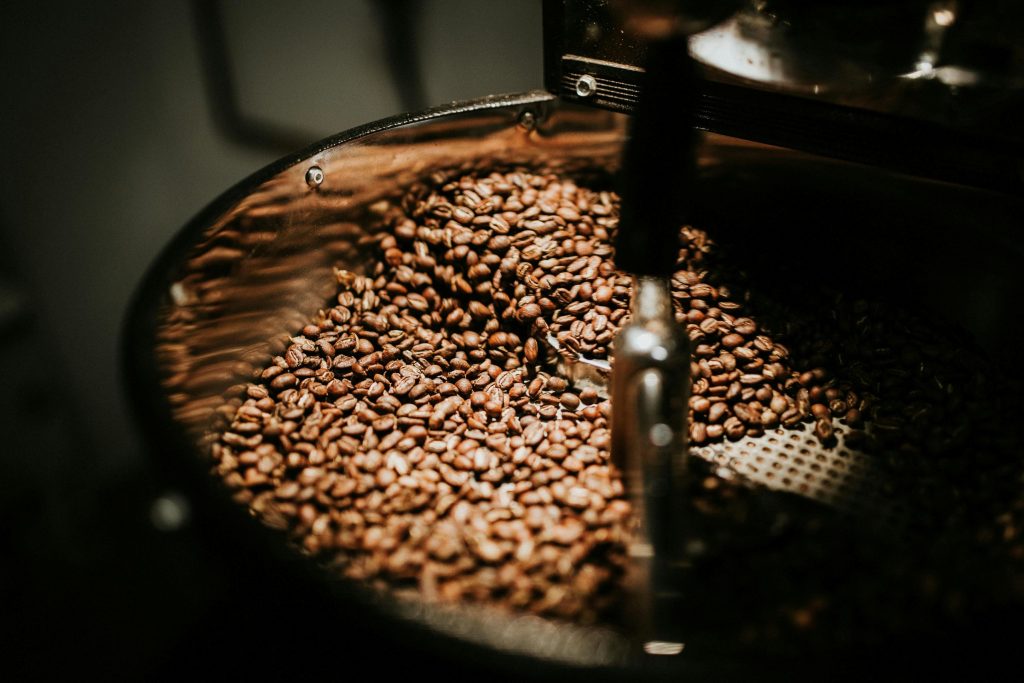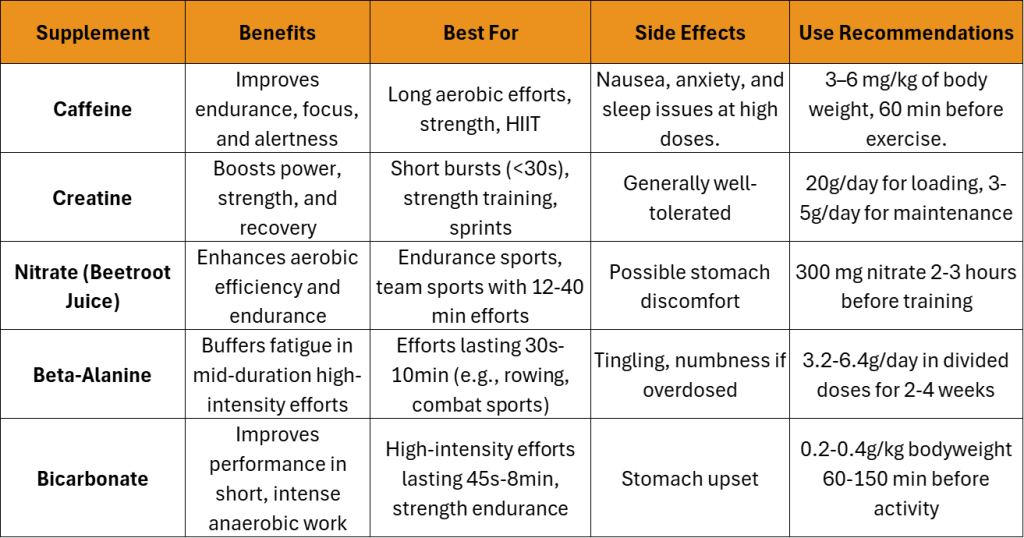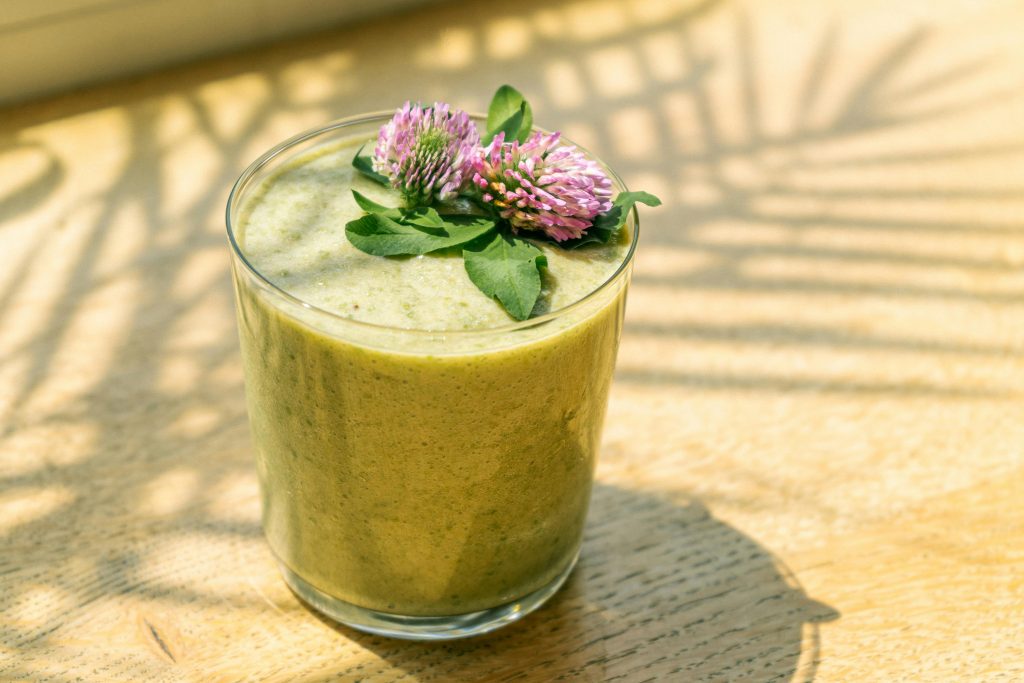In a world awash with marketing claims, miracle powders, and pseudoscientific hype, it’s easy to feel lost when trying to decide which sports supplements for athletes are truly worth your time and money. The truth? Out of the hundreds of supplements promoted to athletes, only five have solid, scientific backing for actually improving performance.
Whether you’re training for a competition or simply trying to get the most out of your workouts, this article breaks down the only supplements proven to help, along with when, how, and why they might be worth considering.
What Are Sports Supplements—and Do You Even Need Them?
By definition, sports supplements are nutrients or compounds consumed in addition to your regular diet to enhance health or performance. They can range from functional foods like fortified drinks to isolated ingredients like creatine or beta-alanine.
Training, diet, and recovery still matter far more than any supplement for most people. Even in the best cases, supplements usually deliver a few percent of added benefit, which might be critical at elite levels, but less so for recreational athletes.
And it’s not all upside: some supplements can cause side effects (like stomach upset or tingling), impact sleep, or come with doping risks. Antidoping Sweden, for instance, advises caution and suggests avoiding supplements unless medically necessary.
The 5 Best Sports Supplements for Athletes - Backed by Science

In 2018, the International Olympic Committee (IOC) presented a consensus report summarizing the scientific evidence for the most common dietary supplements.
The report found that only five dietary supplements had a proven performance-enhancing effect: caffeine, creatine, nitrate, beta-alanine and bicarbonate. Since then, more studies have been published, but the same dietary supplements have proven effective.
Let’s explore the five performance-enhancing supplements with strong evidence behind them.
1. Caffeine: For Endurance, Power, and Focus
Caffeine a central nervous system stimulant, is not just your morning pick-me-up. It's a versatile sports supplement that can increase alertness, reduce perceived fatigue, and enhance neuromuscular function. Its benefits extend to improving aerobic endurance, strength, flexibility, speed, and anaerobic power, making it a go-to for athletes and fitness enthusiasts.
How much caffeine should you take? The sweet spot for performance lies around 3–6 mg per kilogram of body weight, taken roughly an hour before exercise. That’s the equivalent of about 2–4 strong cups of coffee, depending on your weight. For longer workouts, smaller doses during activity can also give a boost, especially when paired with carbohydrates.
That said, more isn’t better. Going above 9 mg/kg doesn’t enhance performance and only increases the risk of nausea, anxiety, jitters, or sleep issues. And because people metabolize caffeine differently, some may not benefit—or could even feel worse. It’s worth experimenting in training to find your personal best dose and timing.

2. Creatine: For Explosive Strength and Muscle Growth
Creatine is your go-to supplement for power, strength, and fast recovery. Although your body makes it naturally and you get some from animal-based foods, you’ll need to supplement to fully saturate your muscle stores and unlock its full benefits.
It works by acting as a quick energy buffer, especially useful in short, explosive efforts like sprints, lifts, and HIIT. Research shows it improves maximum strength, power output, and repeated high-intensity performance, especially during efforts under 30 seconds. Over time, it also supports muscle growth, faster recovery, and better glycogen storage.
To load up quickly, you can take 20g/day (split into 4 doses) for 5–7 days. But you can also go straight to a steady 3–5g daily dose, which reaches the same effect a little more gradually.
With decades of strong evidence behind it, creatine is widely recommended for both casual gym-goers and elite athletes looking to level up their training and recovery.
3. Nitrate (e.g., Beetroot Juice): For Endurance and Intermittent Effort
Nitrate-rich supplements—like beetroot juice—can help you go farther, faster. By improving blood flow and oxygen delivery, nitrate boosts aerobic efficiency, especially during high-intensity efforts under 15 minutes. One meta-analysis found an average 3% improvement in endurance—a meaningful edge for competitive athletes.
Nitrate may also enhance:
- Time to exhaustion in endurance sports
- Intermittent efforts in team-based activities
- Sprint and strength-endurance performance
That said, the benefits appear less pronounced in highly trained individuals with a VO₂ max above 65 ml/kg/min.
Heads up: Some people experience mild stomach discomfort, so it’s best to test it in training before race day.
Want more no-nonsense health insights like this?
Join The Scientific You community and get weekly myth-busting tips, sustainable living advice, and science-backed tools to cut through the wellness noise.
4. Beta-Alanine: For Buffering Fatigue in Mid-Length Efforts
Beta-alanine helps you hold on when your muscles start to burn. This amino acid boosts levels of carnosine, a compound that buffers acid in your muscles during anaerobic work. The result? You can sustain high-intensity efforts lasting 30 seconds to 10 minutes—with performance gains of up to 3%.
To work its magic, beta-alanine needs to be taken consistently for 2–4 weeks. The ideal dose is 3.2–6.4g/day, divided into smaller servings throughout the day to avoid tingling or numbness. Once your muscles are loaded, a maintenance dose of ~1.2g/day keeps levels steady.
Side effects can include a harmless but sometimes distracting skin-tingling sensation. Effects may be smaller in elite athletes, but combining beta-alanine with bicarbonate could give you an extra edge.
5. Bicarbonate: For Strength Endurance and Anaerobic Events
Sodium bicarbonate acts as a buffer in the blood, helping delay fatigue from acid buildup. It’s particularly helpful in short, high-intensity efforts lasting 45 seconds to 8 minutes, like rowing sprints.
Performance gains are modest (about 2%), but meaningful in elite settings. It can also help you get more reps in strength endurance work, like bench press or squats.
Dosing: 0.2–0.4 g per kg of bodyweight, 60–150 minutes before activity. Try splitting the dose or taking it with carbs to reduce gastrointestinal discomfort.
Important: Always trial bicarbonate during training, never for the first time on race day!
Comparison of Sports Supplements for Athletes

Are Sports Supplements Right for You?
Think of supplements as performance enhancers—not performance foundations. Their value depends on several personal factors:
- Your sport and intensity level
- Your training experience and goals
- The quality of your diet, sleep, and recovery
- Your willingness to experiment (and your budget)
If you’re competing at a high level, that extra 2–3% edge could be the difference between placing or not. But if you're still building solid habits, you're likely to see far greater gains by focusing on smart training, good nutrition, and quality rest.
Supplements can help—but they’ll never replace the basics.
Final Thoughts: Science First, Always
The supplement industry thrives on bold claims, shiny packaging, and influencer endorsements. But living evidence-based means knowing how to separate marketing from real science and making choices that truly support your body, goals, and values.
When it comes to performance, stick with what’s proven. These five sports supplements - caffeine, creatine, nitrate, beta-alanine, and bicarbonate - are backed by solid research and deliver measurable results when used wisely.
Just remember: supplements are a bonus, not a foundation. They can fine-tune your progress but never replace smart training, good food, and recovery.
“The good thing about science is that it's true whether or not you believe in it.” – Neil deGrasse Tyson
Science-backed insights are meant to be shared. Pass it on!
Your Next Read...
While the five sports supplements above are backed by science, many others marketed as “natural” or “plant-based” fall short, or even carry hidden risks. Read more about it here:
👉 Natural Products: Beautiful, Marketed, and Not Always Harmless.



